Imperial Hotel Staff Turnover Analysis and Management Solutions Report
VerifiedAdded on 2023/06/10
|10
|3107
|165
Report
AI Summary
This report analyzes the high staff turnover problem at the Imperial Hotel in the UK, focusing on the frontline staff. The study identifies issues such as poor work culture, aggressive management, lack of training, poor pay, and limited promotion opportunities as key contributors. The report examines the financial impact of high turnover, including increased staffing and training costs, and its effect on service quality and customer satisfaction. It explores the application of human relations theory to address the problem, emphasizing the importance of employee needs and motivation, and suggests management strategies such as improved pay, training, and working conditions. The report also considers the role of organizational culture and leadership in reducing turnover and enhancing employee engagement, drawing on the consultant Peter Farnsworth's recommendations for attracting and retaining staff.
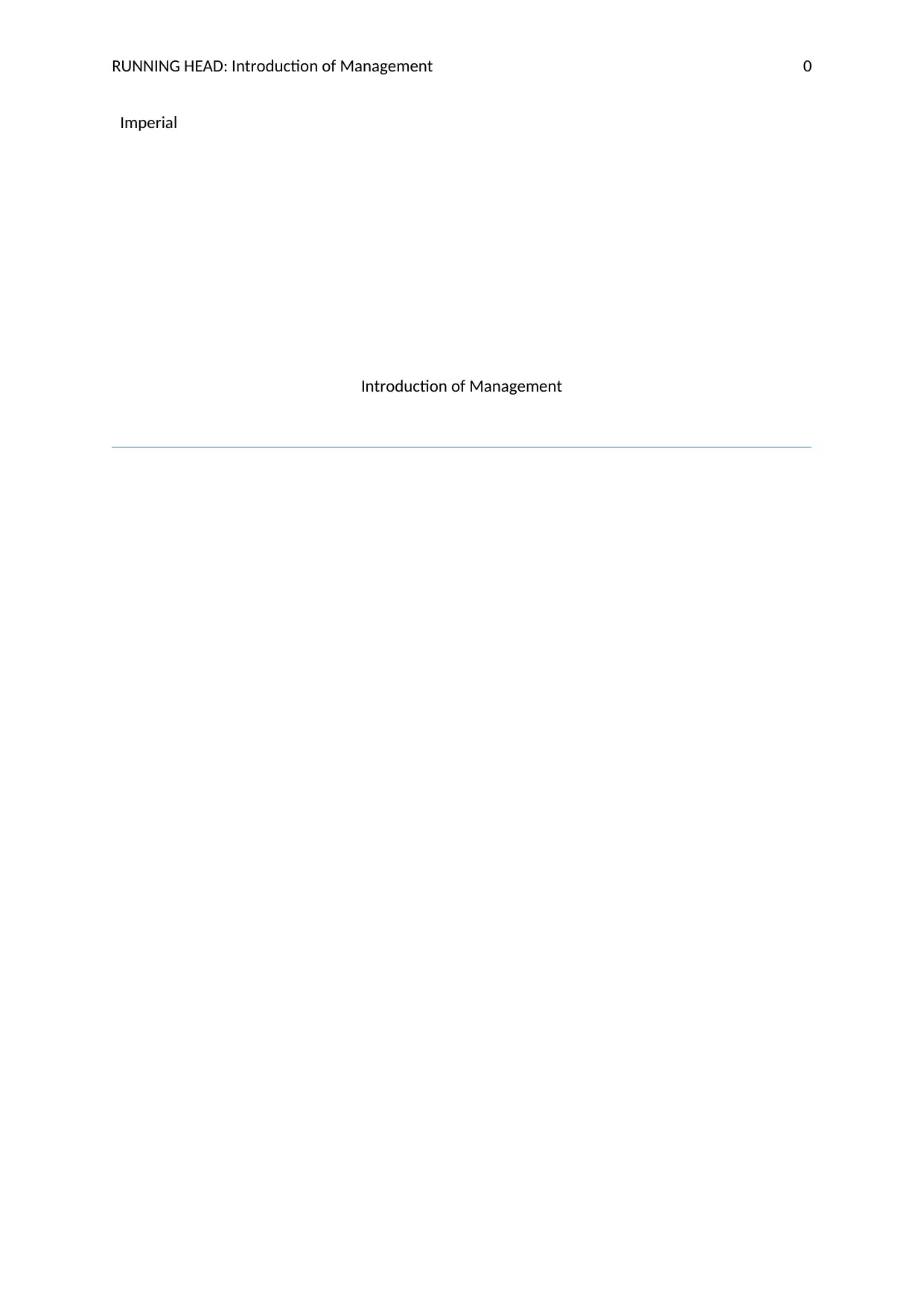
RUNNING HEAD: Introduction of Management 0
Imperial
Introduction of Management
Imperial
Introduction of Management
Paraphrase This Document
Need a fresh take? Get an instant paraphrase of this document with our AI Paraphraser
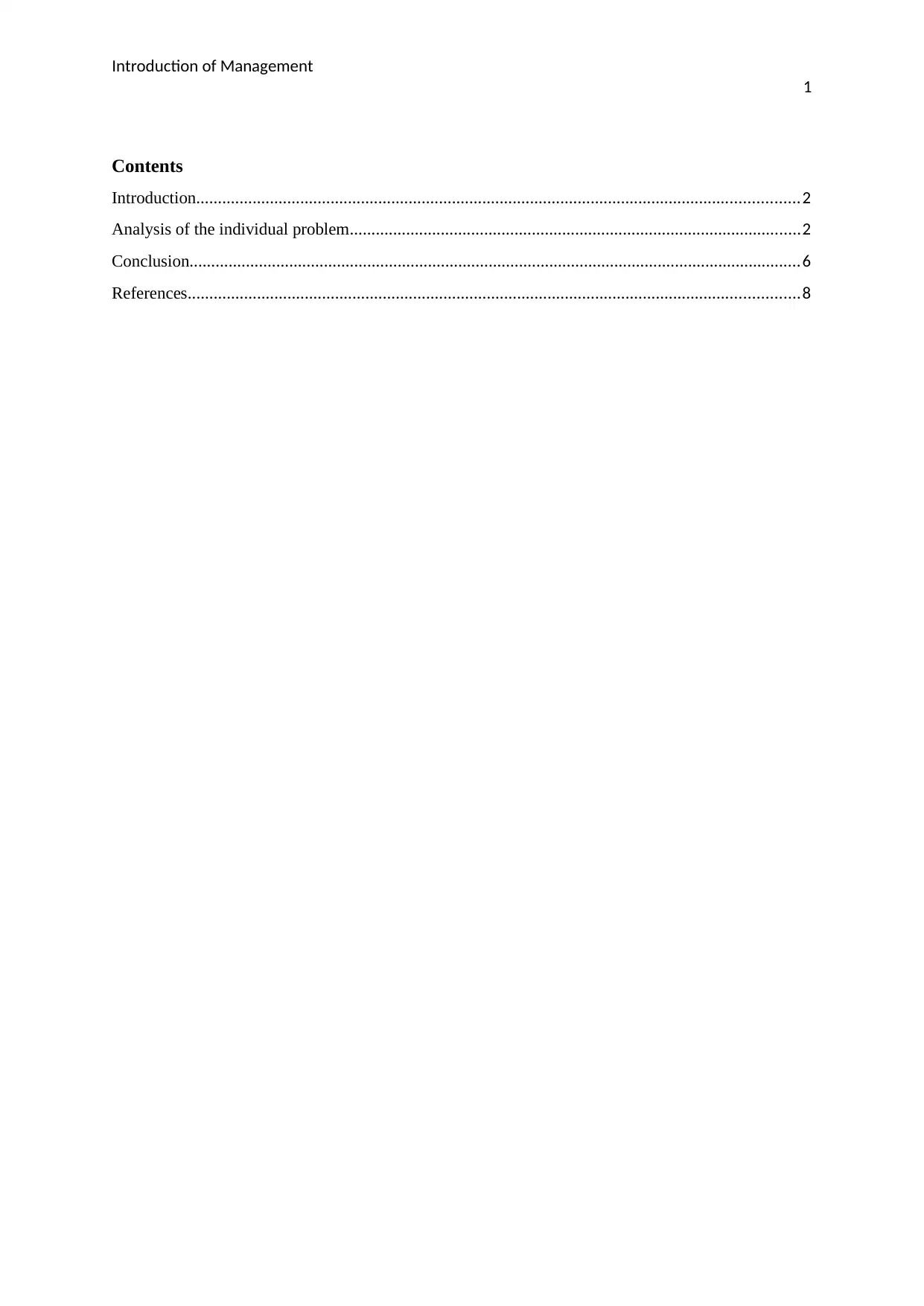
Introduction of Management
1
Contents
Introduction...........................................................................................................................................2
Analysis of the individual problem........................................................................................................2
Conclusion.............................................................................................................................................6
References.............................................................................................................................................8
1
Contents
Introduction...........................................................................................................................................2
Analysis of the individual problem........................................................................................................2
Conclusion.............................................................................................................................................6
References.............................................................................................................................................8
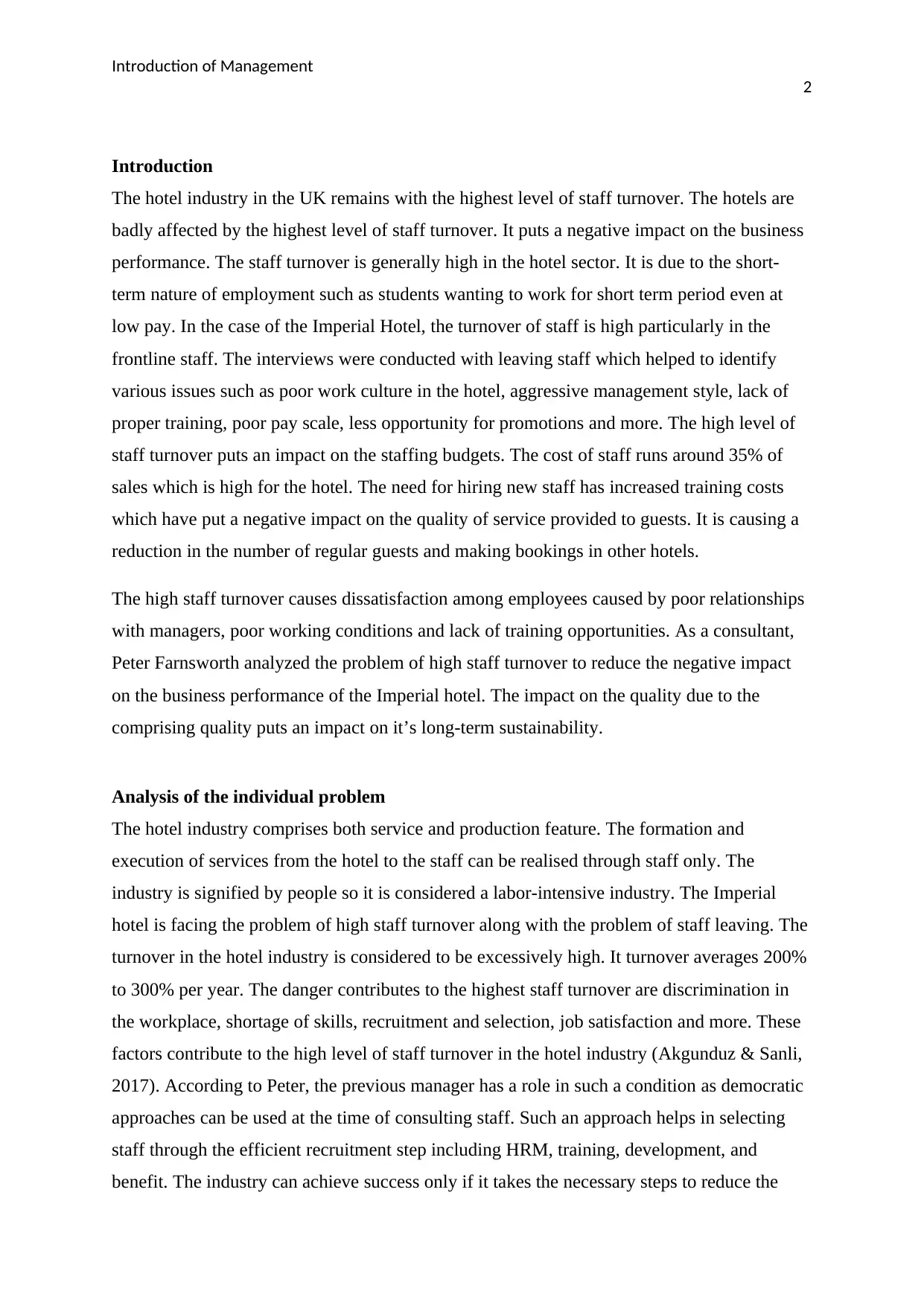
Introduction of Management
2
Introduction
The hotel industry in the UK remains with the highest level of staff turnover. The hotels are
badly affected by the highest level of staff turnover. It puts a negative impact on the business
performance. The staff turnover is generally high in the hotel sector. It is due to the short-
term nature of employment such as students wanting to work for short term period even at
low pay. In the case of the Imperial Hotel, the turnover of staff is high particularly in the
frontline staff. The interviews were conducted with leaving staff which helped to identify
various issues such as poor work culture in the hotel, aggressive management style, lack of
proper training, poor pay scale, less opportunity for promotions and more. The high level of
staff turnover puts an impact on the staffing budgets. The cost of staff runs around 35% of
sales which is high for the hotel. The need for hiring new staff has increased training costs
which have put a negative impact on the quality of service provided to guests. It is causing a
reduction in the number of regular guests and making bookings in other hotels.
The high staff turnover causes dissatisfaction among employees caused by poor relationships
with managers, poor working conditions and lack of training opportunities. As a consultant,
Peter Farnsworth analyzed the problem of high staff turnover to reduce the negative impact
on the business performance of the Imperial hotel. The impact on the quality due to the
comprising quality puts an impact on it’s long-term sustainability.
Analysis of the individual problem
The hotel industry comprises both service and production feature. The formation and
execution of services from the hotel to the staff can be realised through staff only. The
industry is signified by people so it is considered a labor-intensive industry. The Imperial
hotel is facing the problem of high staff turnover along with the problem of staff leaving. The
turnover in the hotel industry is considered to be excessively high. It turnover averages 200%
to 300% per year. The danger contributes to the highest staff turnover are discrimination in
the workplace, shortage of skills, recruitment and selection, job satisfaction and more. These
factors contribute to the high level of staff turnover in the hotel industry (Akgunduz & Sanli,
2017). According to Peter, the previous manager has a role in such a condition as democratic
approaches can be used at the time of consulting staff. Such an approach helps in selecting
staff through the efficient recruitment step including HRM, training, development, and
benefit. The industry can achieve success only if it takes the necessary steps to reduce the
2
Introduction
The hotel industry in the UK remains with the highest level of staff turnover. The hotels are
badly affected by the highest level of staff turnover. It puts a negative impact on the business
performance. The staff turnover is generally high in the hotel sector. It is due to the short-
term nature of employment such as students wanting to work for short term period even at
low pay. In the case of the Imperial Hotel, the turnover of staff is high particularly in the
frontline staff. The interviews were conducted with leaving staff which helped to identify
various issues such as poor work culture in the hotel, aggressive management style, lack of
proper training, poor pay scale, less opportunity for promotions and more. The high level of
staff turnover puts an impact on the staffing budgets. The cost of staff runs around 35% of
sales which is high for the hotel. The need for hiring new staff has increased training costs
which have put a negative impact on the quality of service provided to guests. It is causing a
reduction in the number of regular guests and making bookings in other hotels.
The high staff turnover causes dissatisfaction among employees caused by poor relationships
with managers, poor working conditions and lack of training opportunities. As a consultant,
Peter Farnsworth analyzed the problem of high staff turnover to reduce the negative impact
on the business performance of the Imperial hotel. The impact on the quality due to the
comprising quality puts an impact on it’s long-term sustainability.
Analysis of the individual problem
The hotel industry comprises both service and production feature. The formation and
execution of services from the hotel to the staff can be realised through staff only. The
industry is signified by people so it is considered a labor-intensive industry. The Imperial
hotel is facing the problem of high staff turnover along with the problem of staff leaving. The
turnover in the hotel industry is considered to be excessively high. It turnover averages 200%
to 300% per year. The danger contributes to the highest staff turnover are discrimination in
the workplace, shortage of skills, recruitment and selection, job satisfaction and more. These
factors contribute to the high level of staff turnover in the hotel industry (Akgunduz & Sanli,
2017). According to Peter, the previous manager has a role in such a condition as democratic
approaches can be used at the time of consulting staff. Such an approach helps in selecting
staff through the efficient recruitment step including HRM, training, development, and
benefit. The industry can achieve success only if it takes the necessary steps to reduce the
⊘ This is a preview!⊘
Do you want full access?
Subscribe today to unlock all pages.

Trusted by 1+ million students worldwide
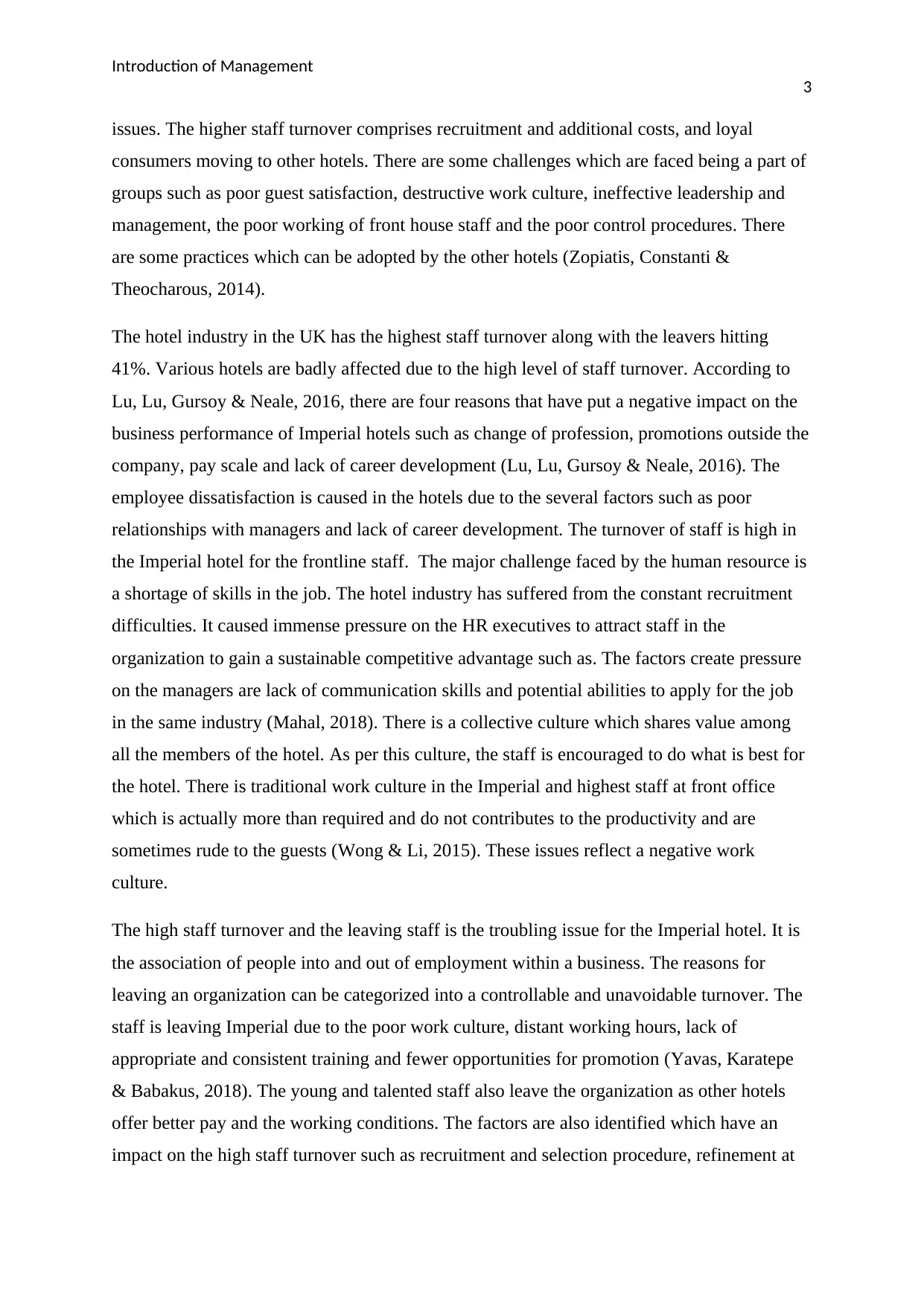
Introduction of Management
3
issues. The higher staff turnover comprises recruitment and additional costs, and loyal
consumers moving to other hotels. There are some challenges which are faced being a part of
groups such as poor guest satisfaction, destructive work culture, ineffective leadership and
management, the poor working of front house staff and the poor control procedures. There
are some practices which can be adopted by the other hotels (Zopiatis, Constanti &
Theocharous, 2014).
The hotel industry in the UK has the highest staff turnover along with the leavers hitting
41%. Various hotels are badly affected due to the high level of staff turnover. According to
Lu, Lu, Gursoy & Neale, 2016, there are four reasons that have put a negative impact on the
business performance of Imperial hotels such as change of profession, promotions outside the
company, pay scale and lack of career development (Lu, Lu, Gursoy & Neale, 2016). The
employee dissatisfaction is caused in the hotels due to the several factors such as poor
relationships with managers and lack of career development. The turnover of staff is high in
the Imperial hotel for the frontline staff. The major challenge faced by the human resource is
a shortage of skills in the job. The hotel industry has suffered from the constant recruitment
difficulties. It caused immense pressure on the HR executives to attract staff in the
organization to gain a sustainable competitive advantage such as. The factors create pressure
on the managers are lack of communication skills and potential abilities to apply for the job
in the same industry (Mahal, 2018). There is a collective culture which shares value among
all the members of the hotel. As per this culture, the staff is encouraged to do what is best for
the hotel. There is traditional work culture in the Imperial and highest staff at front office
which is actually more than required and do not contributes to the productivity and are
sometimes rude to the guests (Wong & Li, 2015). These issues reflect a negative work
culture.
The high staff turnover and the leaving staff is the troubling issue for the Imperial hotel. It is
the association of people into and out of employment within a business. The reasons for
leaving an organization can be categorized into a controllable and unavoidable turnover. The
staff is leaving Imperial due to the poor work culture, distant working hours, lack of
appropriate and consistent training and fewer opportunities for promotion (Yavas, Karatepe
& Babakus, 2018). The young and talented staff also leave the organization as other hotels
offer better pay and the working conditions. The factors are also identified which have an
impact on the high staff turnover such as recruitment and selection procedure, refinement at
3
issues. The higher staff turnover comprises recruitment and additional costs, and loyal
consumers moving to other hotels. There are some challenges which are faced being a part of
groups such as poor guest satisfaction, destructive work culture, ineffective leadership and
management, the poor working of front house staff and the poor control procedures. There
are some practices which can be adopted by the other hotels (Zopiatis, Constanti &
Theocharous, 2014).
The hotel industry in the UK has the highest staff turnover along with the leavers hitting
41%. Various hotels are badly affected due to the high level of staff turnover. According to
Lu, Lu, Gursoy & Neale, 2016, there are four reasons that have put a negative impact on the
business performance of Imperial hotels such as change of profession, promotions outside the
company, pay scale and lack of career development (Lu, Lu, Gursoy & Neale, 2016). The
employee dissatisfaction is caused in the hotels due to the several factors such as poor
relationships with managers and lack of career development. The turnover of staff is high in
the Imperial hotel for the frontline staff. The major challenge faced by the human resource is
a shortage of skills in the job. The hotel industry has suffered from the constant recruitment
difficulties. It caused immense pressure on the HR executives to attract staff in the
organization to gain a sustainable competitive advantage such as. The factors create pressure
on the managers are lack of communication skills and potential abilities to apply for the job
in the same industry (Mahal, 2018). There is a collective culture which shares value among
all the members of the hotel. As per this culture, the staff is encouraged to do what is best for
the hotel. There is traditional work culture in the Imperial and highest staff at front office
which is actually more than required and do not contributes to the productivity and are
sometimes rude to the guests (Wong & Li, 2015). These issues reflect a negative work
culture.
The high staff turnover and the leaving staff is the troubling issue for the Imperial hotel. It is
the association of people into and out of employment within a business. The reasons for
leaving an organization can be categorized into a controllable and unavoidable turnover. The
staff is leaving Imperial due to the poor work culture, distant working hours, lack of
appropriate and consistent training and fewer opportunities for promotion (Yavas, Karatepe
& Babakus, 2018). The young and talented staff also leave the organization as other hotels
offer better pay and the working conditions. The factors are also identified which have an
impact on the high staff turnover such as recruitment and selection procedure, refinement at
Paraphrase This Document
Need a fresh take? Get an instant paraphrase of this document with our AI Paraphraser
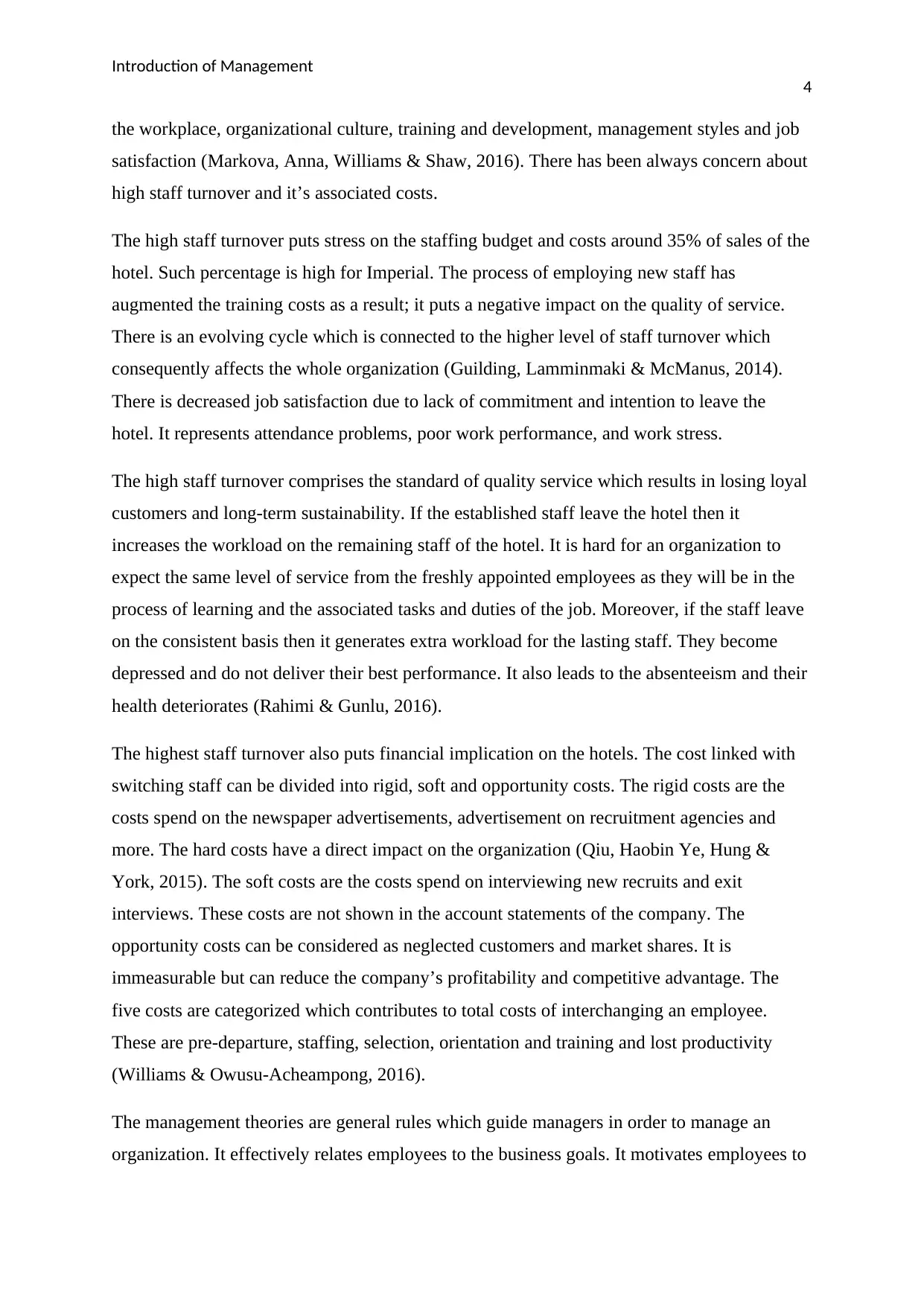
Introduction of Management
4
the workplace, organizational culture, training and development, management styles and job
satisfaction (Markova, Anna, Williams & Shaw, 2016). There has been always concern about
high staff turnover and it’s associated costs.
The high staff turnover puts stress on the staffing budget and costs around 35% of sales of the
hotel. Such percentage is high for Imperial. The process of employing new staff has
augmented the training costs as a result; it puts a negative impact on the quality of service.
There is an evolving cycle which is connected to the higher level of staff turnover which
consequently affects the whole organization (Guilding, Lamminmaki & McManus, 2014).
There is decreased job satisfaction due to lack of commitment and intention to leave the
hotel. It represents attendance problems, poor work performance, and work stress.
The high staff turnover comprises the standard of quality service which results in losing loyal
customers and long-term sustainability. If the established staff leave the hotel then it
increases the workload on the remaining staff of the hotel. It is hard for an organization to
expect the same level of service from the freshly appointed employees as they will be in the
process of learning and the associated tasks and duties of the job. Moreover, if the staff leave
on the consistent basis then it generates extra workload for the lasting staff. They become
depressed and do not deliver their best performance. It also leads to the absenteeism and their
health deteriorates (Rahimi & Gunlu, 2016).
The highest staff turnover also puts financial implication on the hotels. The cost linked with
switching staff can be divided into rigid, soft and opportunity costs. The rigid costs are the
costs spend on the newspaper advertisements, advertisement on recruitment agencies and
more. The hard costs have a direct impact on the organization (Qiu, Haobin Ye, Hung &
York, 2015). The soft costs are the costs spend on interviewing new recruits and exit
interviews. These costs are not shown in the account statements of the company. The
opportunity costs can be considered as neglected customers and market shares. It is
immeasurable but can reduce the company’s profitability and competitive advantage. The
five costs are categorized which contributes to total costs of interchanging an employee.
These are pre-departure, staffing, selection, orientation and training and lost productivity
(Williams & Owusu-Acheampong, 2016).
The management theories are general rules which guide managers in order to manage an
organization. It effectively relates employees to the business goals. It motivates employees to
4
the workplace, organizational culture, training and development, management styles and job
satisfaction (Markova, Anna, Williams & Shaw, 2016). There has been always concern about
high staff turnover and it’s associated costs.
The high staff turnover puts stress on the staffing budget and costs around 35% of sales of the
hotel. Such percentage is high for Imperial. The process of employing new staff has
augmented the training costs as a result; it puts a negative impact on the quality of service.
There is an evolving cycle which is connected to the higher level of staff turnover which
consequently affects the whole organization (Guilding, Lamminmaki & McManus, 2014).
There is decreased job satisfaction due to lack of commitment and intention to leave the
hotel. It represents attendance problems, poor work performance, and work stress.
The high staff turnover comprises the standard of quality service which results in losing loyal
customers and long-term sustainability. If the established staff leave the hotel then it
increases the workload on the remaining staff of the hotel. It is hard for an organization to
expect the same level of service from the freshly appointed employees as they will be in the
process of learning and the associated tasks and duties of the job. Moreover, if the staff leave
on the consistent basis then it generates extra workload for the lasting staff. They become
depressed and do not deliver their best performance. It also leads to the absenteeism and their
health deteriorates (Rahimi & Gunlu, 2016).
The highest staff turnover also puts financial implication on the hotels. The cost linked with
switching staff can be divided into rigid, soft and opportunity costs. The rigid costs are the
costs spend on the newspaper advertisements, advertisement on recruitment agencies and
more. The hard costs have a direct impact on the organization (Qiu, Haobin Ye, Hung &
York, 2015). The soft costs are the costs spend on interviewing new recruits and exit
interviews. These costs are not shown in the account statements of the company. The
opportunity costs can be considered as neglected customers and market shares. It is
immeasurable but can reduce the company’s profitability and competitive advantage. The
five costs are categorized which contributes to total costs of interchanging an employee.
These are pre-departure, staffing, selection, orientation and training and lost productivity
(Williams & Owusu-Acheampong, 2016).
The management theories are general rules which guide managers in order to manage an
organization. It effectively relates employees to the business goals. It motivates employees to
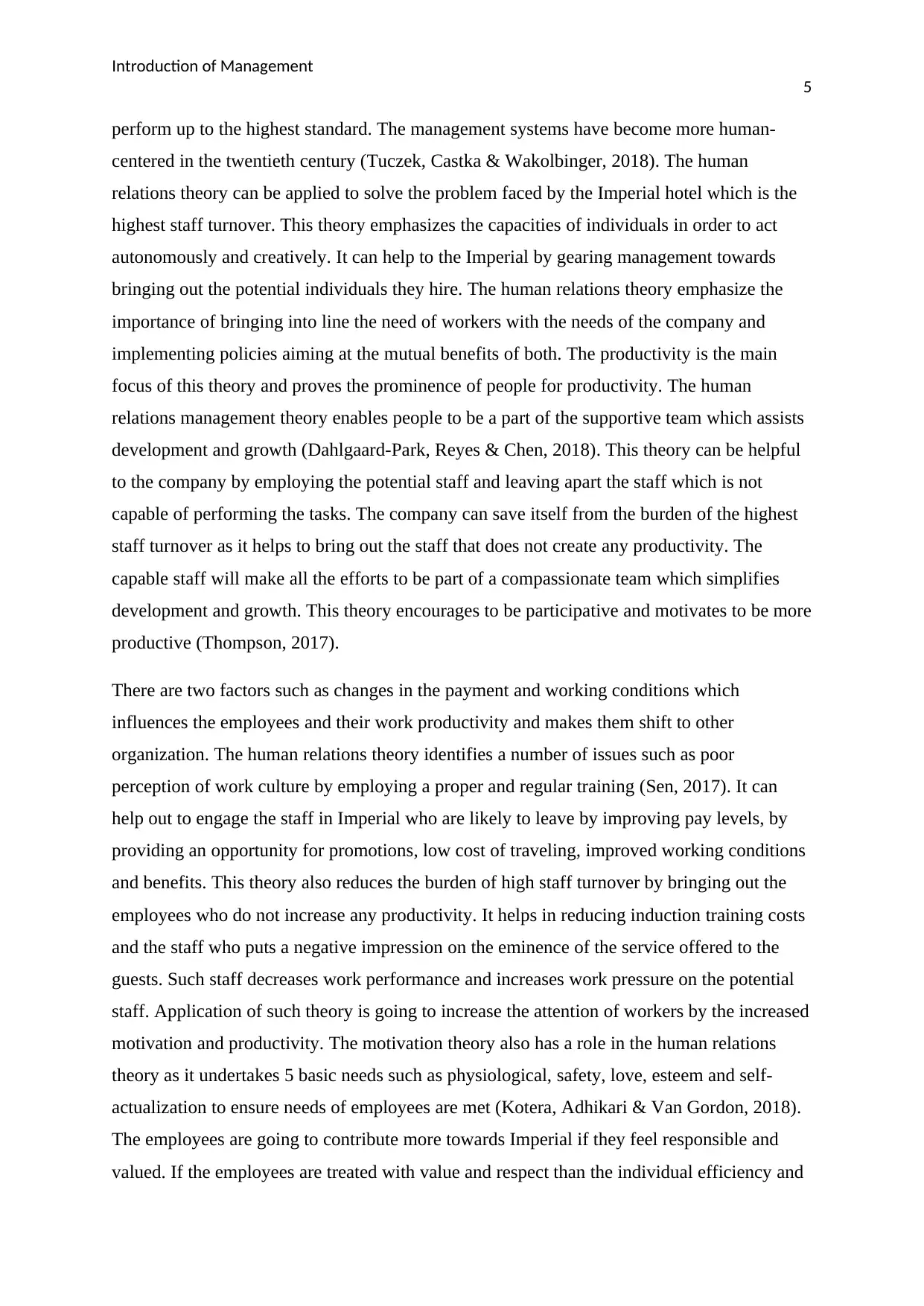
Introduction of Management
5
perform up to the highest standard. The management systems have become more human-
centered in the twentieth century (Tuczek, Castka & Wakolbinger, 2018). The human
relations theory can be applied to solve the problem faced by the Imperial hotel which is the
highest staff turnover. This theory emphasizes the capacities of individuals in order to act
autonomously and creatively. It can help to the Imperial by gearing management towards
bringing out the potential individuals they hire. The human relations theory emphasize the
importance of bringing into line the need of workers with the needs of the company and
implementing policies aiming at the mutual benefits of both. The productivity is the main
focus of this theory and proves the prominence of people for productivity. The human
relations management theory enables people to be a part of the supportive team which assists
development and growth (Dahlgaard-Park, Reyes & Chen, 2018). This theory can be helpful
to the company by employing the potential staff and leaving apart the staff which is not
capable of performing the tasks. The company can save itself from the burden of the highest
staff turnover as it helps to bring out the staff that does not create any productivity. The
capable staff will make all the efforts to be part of a compassionate team which simplifies
development and growth. This theory encourages to be participative and motivates to be more
productive (Thompson, 2017).
There are two factors such as changes in the payment and working conditions which
influences the employees and their work productivity and makes them shift to other
organization. The human relations theory identifies a number of issues such as poor
perception of work culture by employing a proper and regular training (Sen, 2017). It can
help out to engage the staff in Imperial who are likely to leave by improving pay levels, by
providing an opportunity for promotions, low cost of traveling, improved working conditions
and benefits. This theory also reduces the burden of high staff turnover by bringing out the
employees who do not increase any productivity. It helps in reducing induction training costs
and the staff who puts a negative impression on the eminence of the service offered to the
guests. Such staff decreases work performance and increases work pressure on the potential
staff. Application of such theory is going to increase the attention of workers by the increased
motivation and productivity. The motivation theory also has a role in the human relations
theory as it undertakes 5 basic needs such as physiological, safety, love, esteem and self-
actualization to ensure needs of employees are met (Kotera, Adhikari & Van Gordon, 2018).
The employees are going to contribute more towards Imperial if they feel responsible and
valued. If the employees are treated with value and respect than the individual efficiency and
5
perform up to the highest standard. The management systems have become more human-
centered in the twentieth century (Tuczek, Castka & Wakolbinger, 2018). The human
relations theory can be applied to solve the problem faced by the Imperial hotel which is the
highest staff turnover. This theory emphasizes the capacities of individuals in order to act
autonomously and creatively. It can help to the Imperial by gearing management towards
bringing out the potential individuals they hire. The human relations theory emphasize the
importance of bringing into line the need of workers with the needs of the company and
implementing policies aiming at the mutual benefits of both. The productivity is the main
focus of this theory and proves the prominence of people for productivity. The human
relations management theory enables people to be a part of the supportive team which assists
development and growth (Dahlgaard-Park, Reyes & Chen, 2018). This theory can be helpful
to the company by employing the potential staff and leaving apart the staff which is not
capable of performing the tasks. The company can save itself from the burden of the highest
staff turnover as it helps to bring out the staff that does not create any productivity. The
capable staff will make all the efforts to be part of a compassionate team which simplifies
development and growth. This theory encourages to be participative and motivates to be more
productive (Thompson, 2017).
There are two factors such as changes in the payment and working conditions which
influences the employees and their work productivity and makes them shift to other
organization. The human relations theory identifies a number of issues such as poor
perception of work culture by employing a proper and regular training (Sen, 2017). It can
help out to engage the staff in Imperial who are likely to leave by improving pay levels, by
providing an opportunity for promotions, low cost of traveling, improved working conditions
and benefits. This theory also reduces the burden of high staff turnover by bringing out the
employees who do not increase any productivity. It helps in reducing induction training costs
and the staff who puts a negative impression on the eminence of the service offered to the
guests. Such staff decreases work performance and increases work pressure on the potential
staff. Application of such theory is going to increase the attention of workers by the increased
motivation and productivity. The motivation theory also has a role in the human relations
theory as it undertakes 5 basic needs such as physiological, safety, love, esteem and self-
actualization to ensure needs of employees are met (Kotera, Adhikari & Van Gordon, 2018).
The employees are going to contribute more towards Imperial if they feel responsible and
valued. If the employees are treated with value and respect than the individual efficiency and
⊘ This is a preview!⊘
Do you want full access?
Subscribe today to unlock all pages.

Trusted by 1+ million students worldwide
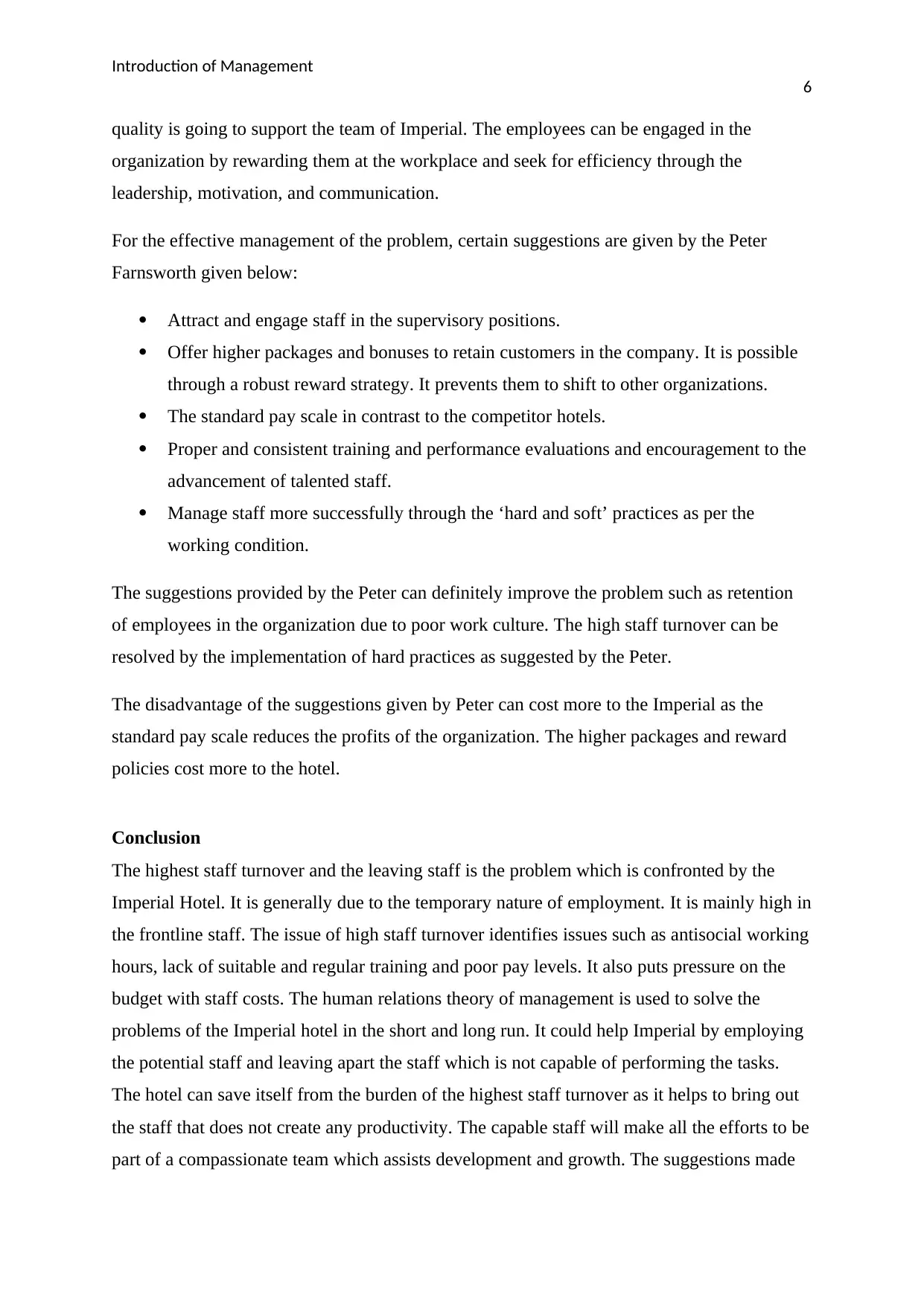
Introduction of Management
6
quality is going to support the team of Imperial. The employees can be engaged in the
organization by rewarding them at the workplace and seek for efficiency through the
leadership, motivation, and communication.
For the effective management of the problem, certain suggestions are given by the Peter
Farnsworth given below:
Attract and engage staff in the supervisory positions.
Offer higher packages and bonuses to retain customers in the company. It is possible
through a robust reward strategy. It prevents them to shift to other organizations.
The standard pay scale in contrast to the competitor hotels.
Proper and consistent training and performance evaluations and encouragement to the
advancement of talented staff.
Manage staff more successfully through the ‘hard and soft’ practices as per the
working condition.
The suggestions provided by the Peter can definitely improve the problem such as retention
of employees in the organization due to poor work culture. The high staff turnover can be
resolved by the implementation of hard practices as suggested by the Peter.
The disadvantage of the suggestions given by Peter can cost more to the Imperial as the
standard pay scale reduces the profits of the organization. The higher packages and reward
policies cost more to the hotel.
Conclusion
The highest staff turnover and the leaving staff is the problem which is confronted by the
Imperial Hotel. It is generally due to the temporary nature of employment. It is mainly high in
the frontline staff. The issue of high staff turnover identifies issues such as antisocial working
hours, lack of suitable and regular training and poor pay levels. It also puts pressure on the
budget with staff costs. The human relations theory of management is used to solve the
problems of the Imperial hotel in the short and long run. It could help Imperial by employing
the potential staff and leaving apart the staff which is not capable of performing the tasks.
The hotel can save itself from the burden of the highest staff turnover as it helps to bring out
the staff that does not create any productivity. The capable staff will make all the efforts to be
part of a compassionate team which assists development and growth. The suggestions made
6
quality is going to support the team of Imperial. The employees can be engaged in the
organization by rewarding them at the workplace and seek for efficiency through the
leadership, motivation, and communication.
For the effective management of the problem, certain suggestions are given by the Peter
Farnsworth given below:
Attract and engage staff in the supervisory positions.
Offer higher packages and bonuses to retain customers in the company. It is possible
through a robust reward strategy. It prevents them to shift to other organizations.
The standard pay scale in contrast to the competitor hotels.
Proper and consistent training and performance evaluations and encouragement to the
advancement of talented staff.
Manage staff more successfully through the ‘hard and soft’ practices as per the
working condition.
The suggestions provided by the Peter can definitely improve the problem such as retention
of employees in the organization due to poor work culture. The high staff turnover can be
resolved by the implementation of hard practices as suggested by the Peter.
The disadvantage of the suggestions given by Peter can cost more to the Imperial as the
standard pay scale reduces the profits of the organization. The higher packages and reward
policies cost more to the hotel.
Conclusion
The highest staff turnover and the leaving staff is the problem which is confronted by the
Imperial Hotel. It is generally due to the temporary nature of employment. It is mainly high in
the frontline staff. The issue of high staff turnover identifies issues such as antisocial working
hours, lack of suitable and regular training and poor pay levels. It also puts pressure on the
budget with staff costs. The human relations theory of management is used to solve the
problems of the Imperial hotel in the short and long run. It could help Imperial by employing
the potential staff and leaving apart the staff which is not capable of performing the tasks.
The hotel can save itself from the burden of the highest staff turnover as it helps to bring out
the staff that does not create any productivity. The capable staff will make all the efforts to be
part of a compassionate team which assists development and growth. The suggestions made
Paraphrase This Document
Need a fresh take? Get an instant paraphrase of this document with our AI Paraphraser
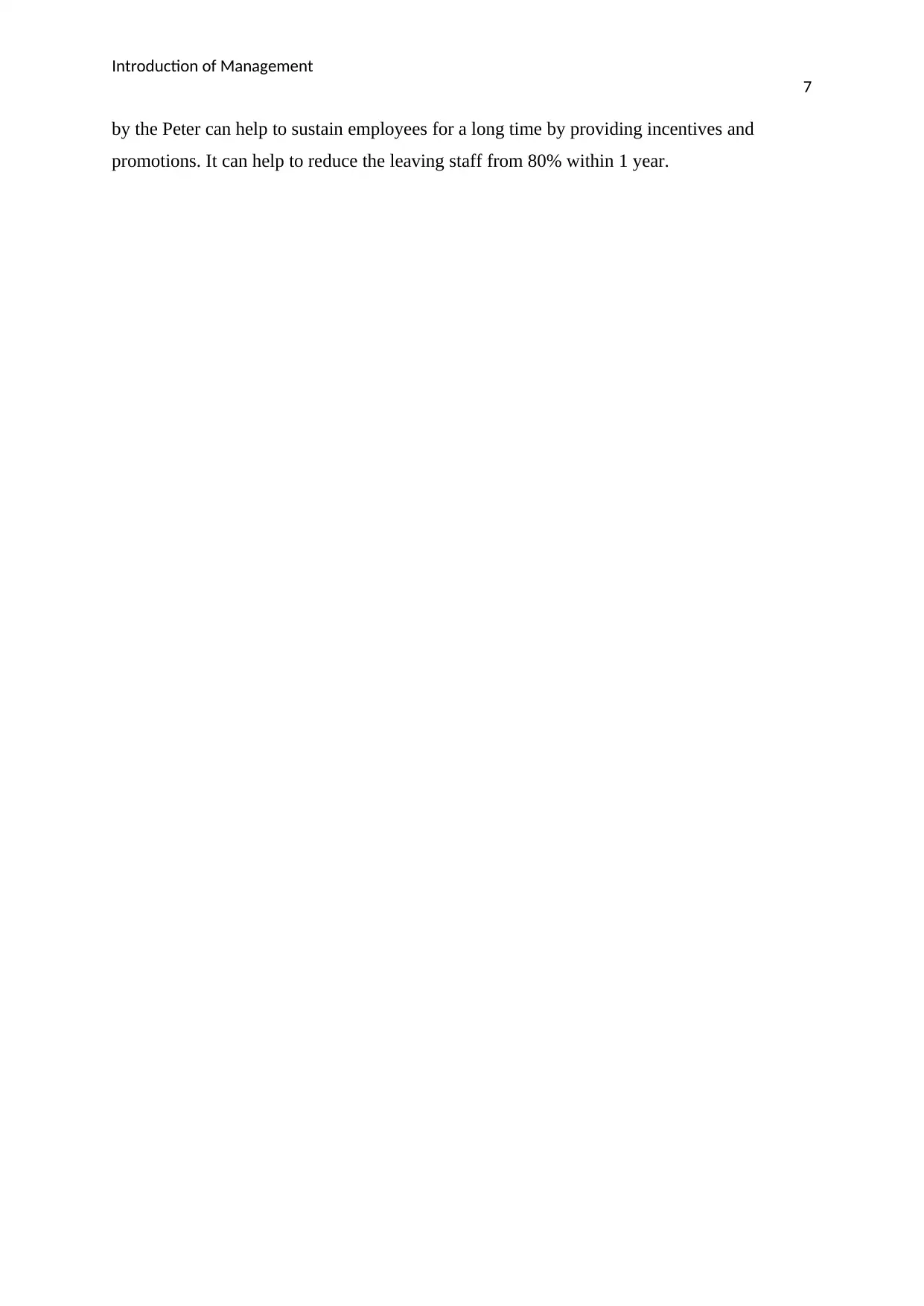
Introduction of Management
7
by the Peter can help to sustain employees for a long time by providing incentives and
promotions. It can help to reduce the leaving staff from 80% within 1 year.
7
by the Peter can help to sustain employees for a long time by providing incentives and
promotions. It can help to reduce the leaving staff from 80% within 1 year.
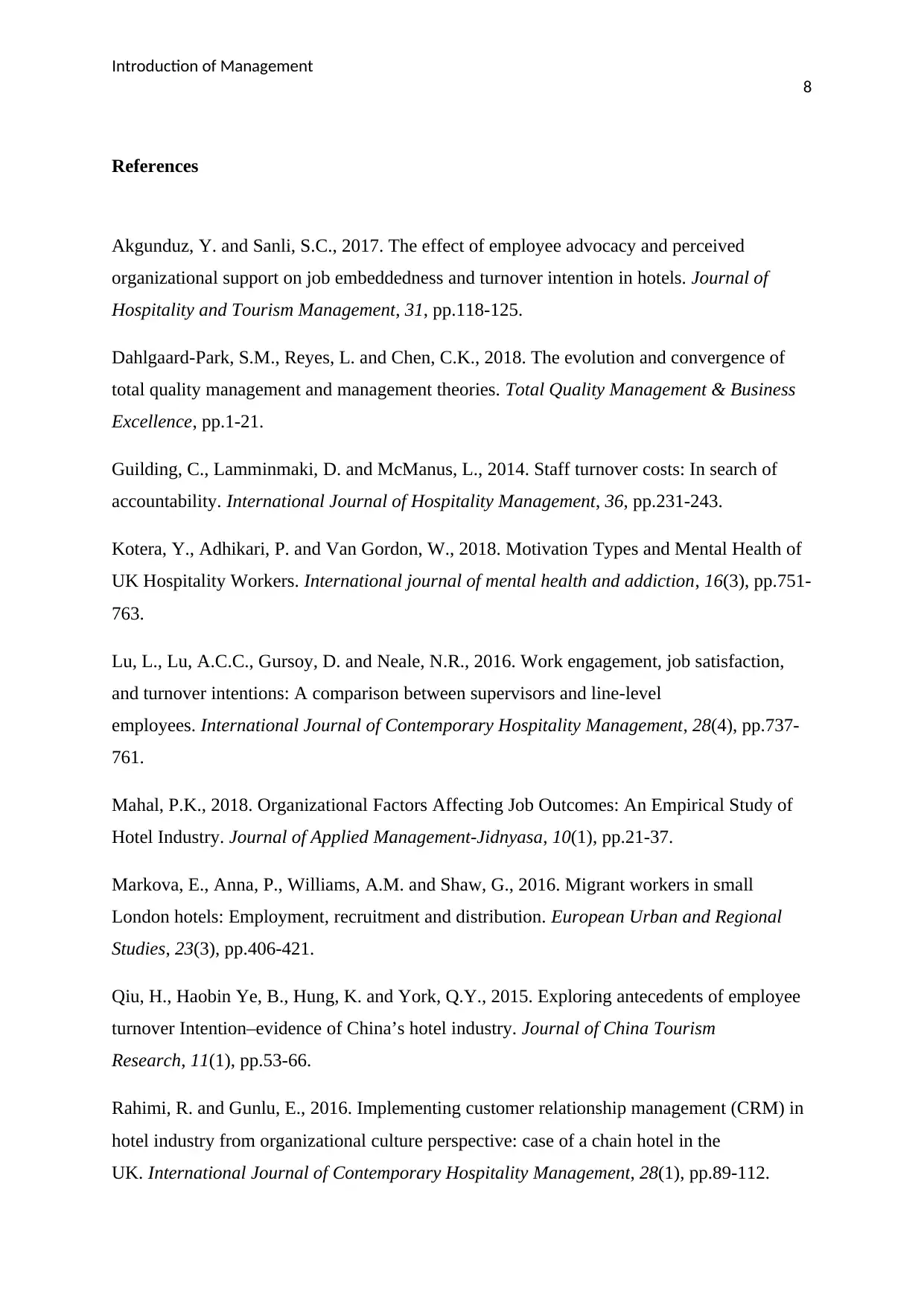
Introduction of Management
8
References
Akgunduz, Y. and Sanli, S.C., 2017. The effect of employee advocacy and perceived
organizational support on job embeddedness and turnover intention in hotels. Journal of
Hospitality and Tourism Management, 31, pp.118-125.
Dahlgaard-Park, S.M., Reyes, L. and Chen, C.K., 2018. The evolution and convergence of
total quality management and management theories. Total Quality Management & Business
Excellence, pp.1-21.
Guilding, C., Lamminmaki, D. and McManus, L., 2014. Staff turnover costs: In search of
accountability. International Journal of Hospitality Management, 36, pp.231-243.
Kotera, Y., Adhikari, P. and Van Gordon, W., 2018. Motivation Types and Mental Health of
UK Hospitality Workers. International journal of mental health and addiction, 16(3), pp.751-
763.
Lu, L., Lu, A.C.C., Gursoy, D. and Neale, N.R., 2016. Work engagement, job satisfaction,
and turnover intentions: A comparison between supervisors and line-level
employees. International Journal of Contemporary Hospitality Management, 28(4), pp.737-
761.
Mahal, P.K., 2018. Organizational Factors Affecting Job Outcomes: An Empirical Study of
Hotel Industry. Journal of Applied Management-Jidnyasa, 10(1), pp.21-37.
Markova, E., Anna, P., Williams, A.M. and Shaw, G., 2016. Migrant workers in small
London hotels: Employment, recruitment and distribution. European Urban and Regional
Studies, 23(3), pp.406-421.
Qiu, H., Haobin Ye, B., Hung, K. and York, Q.Y., 2015. Exploring antecedents of employee
turnover Intention–evidence of China’s hotel industry. Journal of China Tourism
Research, 11(1), pp.53-66.
Rahimi, R. and Gunlu, E., 2016. Implementing customer relationship management (CRM) in
hotel industry from organizational culture perspective: case of a chain hotel in the
UK. International Journal of Contemporary Hospitality Management, 28(1), pp.89-112.
8
References
Akgunduz, Y. and Sanli, S.C., 2017. The effect of employee advocacy and perceived
organizational support on job embeddedness and turnover intention in hotels. Journal of
Hospitality and Tourism Management, 31, pp.118-125.
Dahlgaard-Park, S.M., Reyes, L. and Chen, C.K., 2018. The evolution and convergence of
total quality management and management theories. Total Quality Management & Business
Excellence, pp.1-21.
Guilding, C., Lamminmaki, D. and McManus, L., 2014. Staff turnover costs: In search of
accountability. International Journal of Hospitality Management, 36, pp.231-243.
Kotera, Y., Adhikari, P. and Van Gordon, W., 2018. Motivation Types and Mental Health of
UK Hospitality Workers. International journal of mental health and addiction, 16(3), pp.751-
763.
Lu, L., Lu, A.C.C., Gursoy, D. and Neale, N.R., 2016. Work engagement, job satisfaction,
and turnover intentions: A comparison between supervisors and line-level
employees. International Journal of Contemporary Hospitality Management, 28(4), pp.737-
761.
Mahal, P.K., 2018. Organizational Factors Affecting Job Outcomes: An Empirical Study of
Hotel Industry. Journal of Applied Management-Jidnyasa, 10(1), pp.21-37.
Markova, E., Anna, P., Williams, A.M. and Shaw, G., 2016. Migrant workers in small
London hotels: Employment, recruitment and distribution. European Urban and Regional
Studies, 23(3), pp.406-421.
Qiu, H., Haobin Ye, B., Hung, K. and York, Q.Y., 2015. Exploring antecedents of employee
turnover Intention–evidence of China’s hotel industry. Journal of China Tourism
Research, 11(1), pp.53-66.
Rahimi, R. and Gunlu, E., 2016. Implementing customer relationship management (CRM) in
hotel industry from organizational culture perspective: case of a chain hotel in the
UK. International Journal of Contemporary Hospitality Management, 28(1), pp.89-112.
⊘ This is a preview!⊘
Do you want full access?
Subscribe today to unlock all pages.

Trusted by 1+ million students worldwide
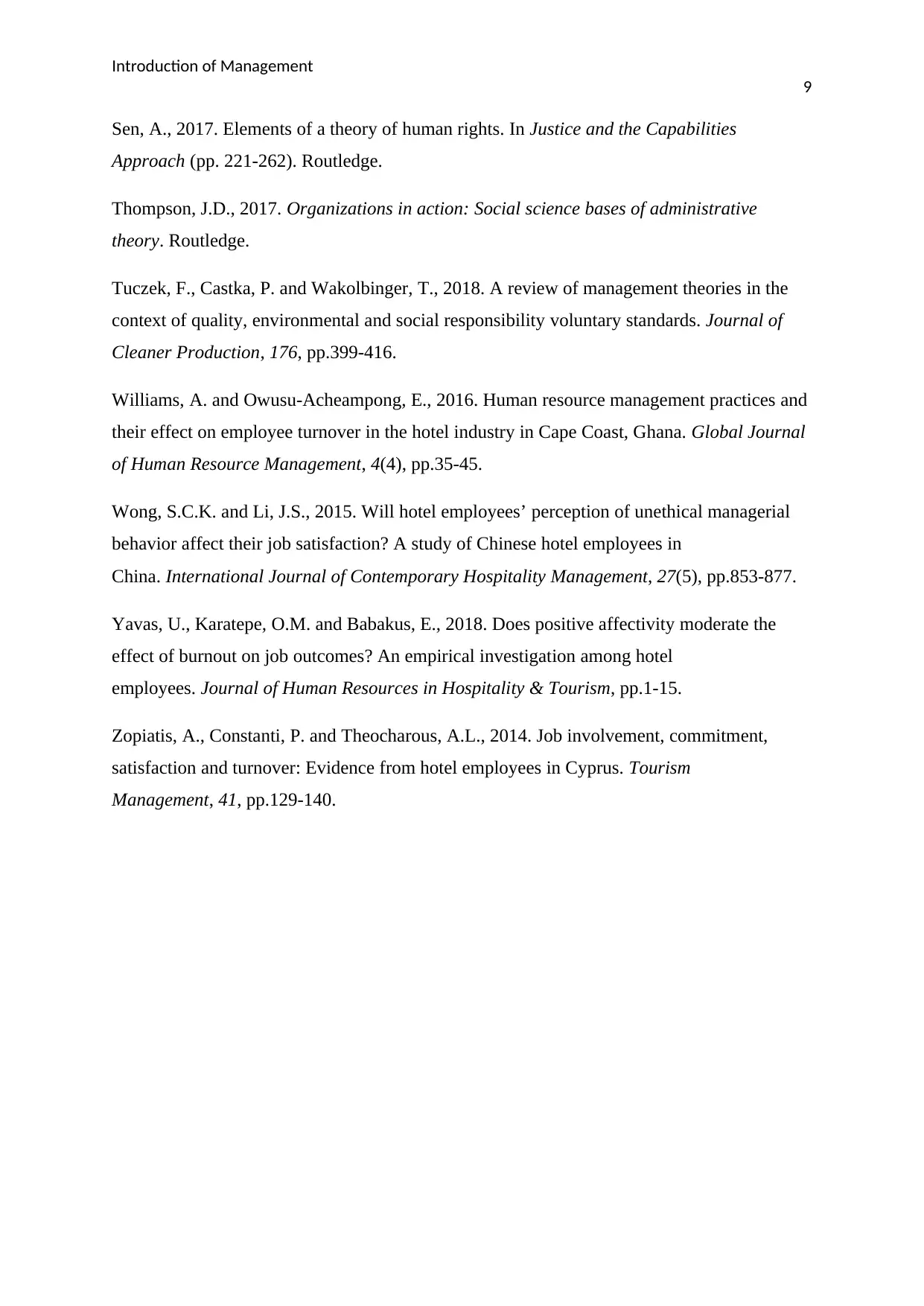
Introduction of Management
9
Sen, A., 2017. Elements of a theory of human rights. In Justice and the Capabilities
Approach (pp. 221-262). Routledge.
Thompson, J.D., 2017. Organizations in action: Social science bases of administrative
theory. Routledge.
Tuczek, F., Castka, P. and Wakolbinger, T., 2018. A review of management theories in the
context of quality, environmental and social responsibility voluntary standards. Journal of
Cleaner Production, 176, pp.399-416.
Williams, A. and Owusu-Acheampong, E., 2016. Human resource management practices and
their effect on employee turnover in the hotel industry in Cape Coast, Ghana. Global Journal
of Human Resource Management, 4(4), pp.35-45.
Wong, S.C.K. and Li, J.S., 2015. Will hotel employees’ perception of unethical managerial
behavior affect their job satisfaction? A study of Chinese hotel employees in
China. International Journal of Contemporary Hospitality Management, 27(5), pp.853-877.
Yavas, U., Karatepe, O.M. and Babakus, E., 2018. Does positive affectivity moderate the
effect of burnout on job outcomes? An empirical investigation among hotel
employees. Journal of Human Resources in Hospitality & Tourism, pp.1-15.
Zopiatis, A., Constanti, P. and Theocharous, A.L., 2014. Job involvement, commitment,
satisfaction and turnover: Evidence from hotel employees in Cyprus. Tourism
Management, 41, pp.129-140.
9
Sen, A., 2017. Elements of a theory of human rights. In Justice and the Capabilities
Approach (pp. 221-262). Routledge.
Thompson, J.D., 2017. Organizations in action: Social science bases of administrative
theory. Routledge.
Tuczek, F., Castka, P. and Wakolbinger, T., 2018. A review of management theories in the
context of quality, environmental and social responsibility voluntary standards. Journal of
Cleaner Production, 176, pp.399-416.
Williams, A. and Owusu-Acheampong, E., 2016. Human resource management practices and
their effect on employee turnover in the hotel industry in Cape Coast, Ghana. Global Journal
of Human Resource Management, 4(4), pp.35-45.
Wong, S.C.K. and Li, J.S., 2015. Will hotel employees’ perception of unethical managerial
behavior affect their job satisfaction? A study of Chinese hotel employees in
China. International Journal of Contemporary Hospitality Management, 27(5), pp.853-877.
Yavas, U., Karatepe, O.M. and Babakus, E., 2018. Does positive affectivity moderate the
effect of burnout on job outcomes? An empirical investigation among hotel
employees. Journal of Human Resources in Hospitality & Tourism, pp.1-15.
Zopiatis, A., Constanti, P. and Theocharous, A.L., 2014. Job involvement, commitment,
satisfaction and turnover: Evidence from hotel employees in Cyprus. Tourism
Management, 41, pp.129-140.
1 out of 10
Related Documents
Your All-in-One AI-Powered Toolkit for Academic Success.
+13062052269
info@desklib.com
Available 24*7 on WhatsApp / Email
![[object Object]](/_next/static/media/star-bottom.7253800d.svg)
Unlock your academic potential
Copyright © 2020–2026 A2Z Services. All Rights Reserved. Developed and managed by ZUCOL.



